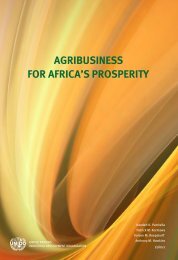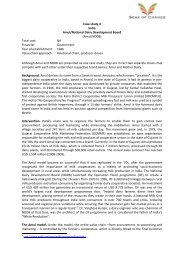Collection of Case Studies 2. - Seas of Change Initiative
Collection of Case Studies 2. - Seas of Change Initiative
Collection of Case Studies 2. - Seas of Change Initiative
You also want an ePaper? Increase the reach of your titles
YUMPU automatically turns print PDFs into web optimized ePapers that Google loves.
1<strong>2.</strong> <strong>Initiative</strong> for promoting rural entrepreneurship inRwandaAuthor: Espérance MukarugwizaOrganisation: Agri-Pro FocusThis case is one <strong>of</strong> specifically prepared by Agri-Pro Focus for the “<strong>Seas</strong> <strong>of</strong> <strong>Change</strong>” event, taking place in TheHague, 11-13 April 201<strong>2.</strong>Why is the case an interesting example?The IPER Program is a joint initiative <strong>of</strong> NGO, Private Sector, Government, Research institutions and farmerorganisations who strive to develop entrepreneurship <strong>of</strong> those who will be feeding the world in 2050.1. Context and backgroundAgriculture in Rwanda is for more than 90% smallholder agriculture with average acreage <strong>of</strong> less than 0,5 ha perfamily. To boost agricultural development and food production, developing entrepreneurship <strong>of</strong> successfulsmallholders is key. It is from this perspective that ICCO, Agriterra and Terrafina in 2008 decided to join forces inRwanda to make value chains more competitive, sustainable and inclusive. They developed a joined program andnamed it IPER (<strong>Initiative</strong> pour la Promotion de l’Entrepreneuriat Rural). When Agri-ProFocus late 2008 began withestablishing Agri-Hubs other Agri-ProFocus members (SNV, IFDC, Oxfam/Novib, WUR, KIT, VHL) joined theinitiative and IPER became the major activity <strong>of</strong> Agri-Hub Rwanda. All partners committed a certain amount <strong>of</strong> timeand/or money for a 4 year period (2009-2012). In the division <strong>of</strong> labor, the idea was that APF members, throughtheir existing partner relations and activities, would cater for the facilitation and coaching <strong>of</strong> commodity-orientedAgri-Business Clusters. All Agri-Business Clusters would be facilitated in the same way and also would get theopportunity to draw upon a small basket-fund for activities to resolve “burning issues” hampering the development<strong>of</strong> the respective Agri-Business Cluster. In 2009 IPER started with 15 Agri-Business Clusters in 6 Value Chains. Atthe end <strong>of</strong> 2011 the number <strong>of</strong> Agri-Business Clusters had increased up to 30, involving about 250 cooperativeswith an impact on more than 7,000 households.Within 3 years IPER has developed a successful model for boosting farmer entrepreneurship. Although theprogram as such will end in 2012, Agri-Business Cluster Leaders already have indicated that they will continuepulling together chain actors to find solutions for “burning issues” in the Cluster.<strong>2.</strong> Underlying business modelThe IPER program is a way to help organized farmers develop their business. At the heart is the idea <strong>of</strong>facilitating all actors along a specific value chain in a specific area to come together and discuss how to improvethe functioning <strong>of</strong> the value chain for the gain <strong>of</strong> all (win-win solutions). The model is inspired by CASE(Competitive agricultural systems and enterprises), developed by IFDC in West Africa.In general the programme has the following elements:1) Training <strong>of</strong> local Agri-Business Cluster facilitators, mostly working for local NGO’s2) Put in place a small ‘basket-fund’ to finance quick actions (consultancies, study-trips, etc.) to resolveburning–issues.The Cluster facilitators facilitate the process-cycle <strong>of</strong> Agri-Business Cluster development:1) Identifying “Cluster Leaders” (mostly leaders <strong>of</strong> farmers-organisations) and help them to organise a multistakeholderworkshop with representatives <strong>of</strong> all actors along the chosen value chains in their respectiveareas2) During the workshop define business targets and “burning issues” which should be resolved to improvethe functioning <strong>of</strong> the chain and reduce risks and/or increase pr<strong>of</strong>its for all actors,3) Make action-plans, find funding ( quick actions – basket fund; investments – banks) and implementimprovements4) Evaluate results and define new targets and “burning issues”, etc.53







